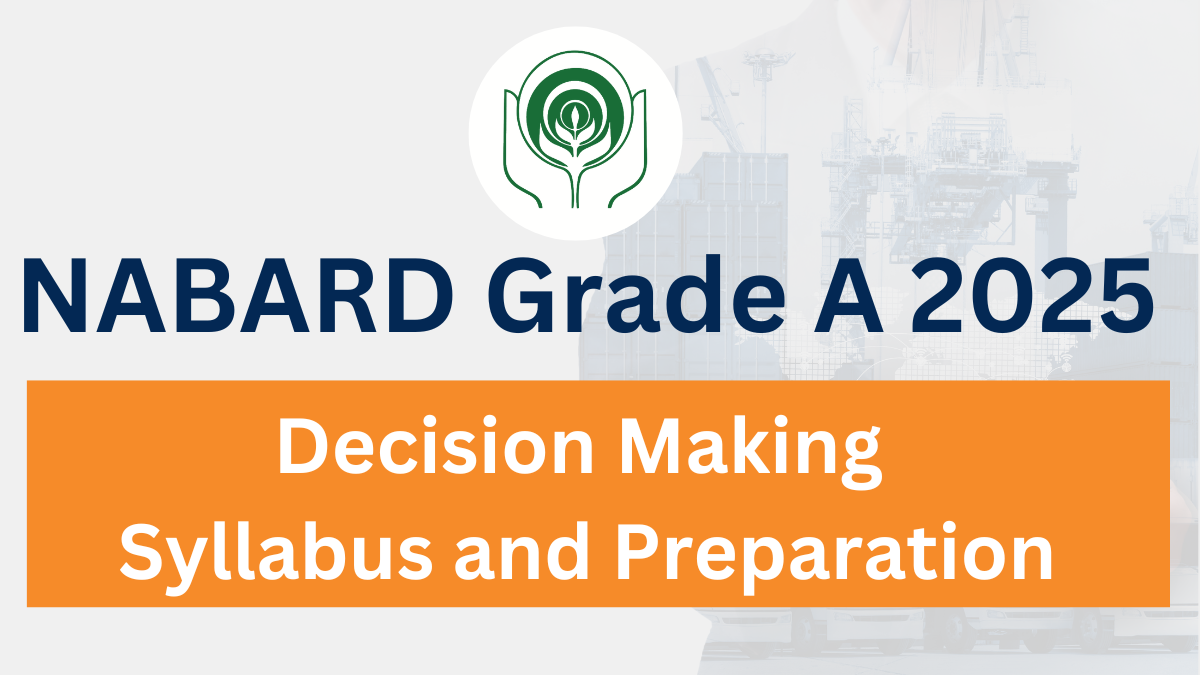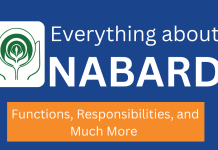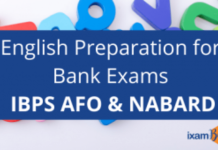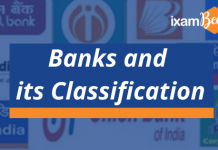In a role like a NABARD Grade A officer, decision-making is your compass guiding the ship through uncharted waters. It’s not just about making choices; it’s about making the right ones. Think of yourself as the captain steering through a storm, weighing options, and ensuring the safety of your crew. In these prestigious government positions, your decisions wield influence over policies, farmers, rural development, and the economy. So, mastering decision-making is not merely a skill; it’s the key to shaping the nation’s progress.
Recognizing this importance led to including the Decision-making topic in the NABARD Grade A syllabus in 2025. The Decision-making part of the NABARD Grade A Exam notification assesses your ability to make sound judgments in complex situations. It scrutinizes your analytical acumen, problem-solving skills, and ethical reasoning. Questions often present scenarios reflective of the challenges faced by Grade A officers in their roles. Therefore, mastering this topic is indispensable for you aiming to navigate the NABARD Grade A Exam successfully.
To excel in Decision-making, hone your critical thinking skills, and cultivate a holistic approach to problem-solving. Regular practice with mock tests and previous year papers will familiarize you with the diverse scenarios posed in the exam. Additionally, staying updated on current affairs and relevant policies ensures a well-rounded perspective for making informed decisions.
Let’s dive into the essence of the Decision-making segment in the NABARD Grade A syllabus and explore tips for adeptly tackling questions related to it.

Inclusion of Decision-Making Topic in NABARD Grade A Syllabus
Introducing Decision-making as a new subject in the Preliminary examination for the NABARD Grade A recruitment exam was a significant change. As this addition is relatively recent in the NABARD Grade A syllabus and exam pattern, we have prepared a comprehensive article to address all your concerns about the decision-making syllabus, its significance in the exam, and how you can effectively prepare for this topic. You can also check the NABARD Grade A 2025 exam dates, salary structure, eligibility criteria, and much more.
The inclusion of decision-making in these prestigious exams reflects the growing importance of this skill, especially for managerial positions. In this article, we will delve into the specifics of the Decision-Making section, including its syllabus, the types of questions you can expect, and valuable tips to excel in this newly introduced segment of the NABARD Grade A exam. So, let’s embark on this journey to master Decision Making for a successful NABARD Grade A examination.
Since this is a fairly new introduction to the NABARD Grade A syllabus and exam pattern, we have prepared an exhaustive article that will clarify all your doubts concerning the Decision-Making syllabus, its weightage in the exam, and how you can efficiently prepare for this subject.
NABARD Grade A 2025 Decision Making
Decision-Making is a subject that requires us to make choices by studying the data given to us to arrive at the best possible outcome. Since these NABARD vacancies are for managerial-level posts, you will be required to make several tough choices by weighing the pros and cons of every action and its probable reaction. For the same, the NABARD Grade A exam aims to gauge a candidate’s decision-making ability to select the best candidates for these posts.
Decision Making is part of the Qualifying Section for Phase 1, along with Reasoning, English, Computer Knowledge, and Quantitative Aptitude. Ergo, it is imperative that students earn cut-off marks in each of these subjects. You can tentatively expect the cut-off to be at 4 marks for Decision Making.
NABARD Grade A Decision-Making Syllabus
The syllabus for the new section on Decision-Making introduced in NABARD Grade A has been given below.
Behavioural Decision-Making:
These are a very interesting pattern of questions. Here, we are faced with situations that may arise in our everyday lives as well that involve dealing with people depending upon their temperament, mainly if the problem involves dealing with people of different temperaments at the same time. Here, the obvious decisions you might make may not be enough, as you also have to consider the results or reactions that arise from your choices.
Managerial Decision Making: In this pattern of questions, a scenario will be provided wherein you will be asked to assume that you are in a managerial position and have to take a decision accordingly. As you may expect, such questions can involve how you would tackle situations concerning your team members.
Eligibility Criteria Based on Decision-Making:
In Eligibility Criteria Based Decision-Making, diverse eligibility criteria are presented for the recruitment of specific personnel. The provided data sets the stage for follow-up questions where candidates are tasked with determining the most eligible individual for the given post. This scenario-based questioning not only evaluates candidates’ grasp of eligibility conditions but also assesses their decision-making skills in identifying the most suitable candidate. Navigating through this segment in the NABARD Grade A Exam demands a strategic approach, combining a meticulous understanding of eligibility criteria with effective decision-making prowess.
Data Arrangements Based Decision Making:
In Data Arrangements Based Decision Making, the name itself reveals that you’ll encounter a substantial amount of data in the question. Your initial task involves organizing and arranging this data before delving into solving subsequent questions. This preparatory step is pivotal for a systematic and efficient approach to address the follow-up questions. By effectively managing and organizing the provided data, you set the stage for a clearer understanding and more effective analysis, facilitating your ability to derive meaningful insights and arrive at accurate solutions in the NABARD Grade A Exam’s Data Interpretation section.
Mathematical Decision Making:
Mathematical Decision-Making questions in the NABARD Grade A Exam are like Data Interpretation or Logical Reasoning queries. They are data-intensive and require candidates to meticulously analyze the provided information before attempting to solve the questions. These questions delve into mathematical reasoning and require a strategic approach to decipher complex data sets. Adeptly navigating this segment demands not only mathematical proficiency but also a keen analytical mindset, ensuring candidates can extract valuable insights and make informed decisions based on the mathematical intricacies presented in these questions.
NABARD Grade A Decision-Making Sample Questions
Here are some sample questions on Decision-making based on the latest exam syllabus of the NABARD Grade A Exam. This will help you to get a better understanding of the question type and pattern.
Q. 1. The decision-making process that involves defining the problem, identifying alternatives, evaluating alternatives, selecting an alternative, and implementing the decision is known as __________
Process decision
Satisficing decision
Rational decision
Intuitive decision
Reactive decision
Ans 1. Rational Decision
Explanation – Rational decision-making is a multi-step process for making choices between alternatives. The process of rational decision-making favours logic, objectivity, and analysis over subjectivity and insight.
The rational decision-making process involves careful, methodical steps like identifying the problem, identifying the alternatives, evaluating them and then selecting the best alternative.
Q 2. The behavioural theory of decision-making was given by _________
Daniel Kahneman
Henry Mintzberg
Herbert Simon
Edward Deming
Albert Bandura
Ans 2. Herbert Simon
Explanation – The behavioural approach is also known as the descriptive approach and administrative model. This theory is proposed by Herbert A. Simon, a well-known economist who attempts to explain how decisions are made in real-life situations. A manager has to make decisions under different conditions and situations.
Q 3. Which of the following decision-making techniques involves the use of a ‘yes’ or ‘no’ solution to arrive at a decision?
Nominal Group Technique
Didactic Interaction
Multi-voting technique
Delphi Technique
Brainstorming technique
Ans 3. Didactic Interaction
Explanation – Didactic Interaction is used when decisions to be taken are dichotomous in nature. For this method, instead of one group of experts, two group of experts are created, one favouring a “yes” decision and other favouring a “no” decision. Each group then generates the list of justifications for their decisions and then interact and discuss with their findings. With mutual interactions and discussions, both the groups arrive at a consensus and a decision is taken.
Q 4. What do we call a group brought together from different functions and levels of an organization to consider ways in which the organization’s activities could be improved?
Technical team
Quality team
Process improvement team
Task team
Unit team
Ans 4. Process improvement team
Explanation – A Process Improvement Team is a group of individuals who work well together and bring specific skills to the table (from different functions) to solve a problem.
Tips to Solve Decision-Making Questions
- Before all else, make sure you go over the NABARD Grade A Prelims Previous Year Papers to understand what exactly was asked in this section of the exam.
- Study the problem carefully before you answer. While it is correct that speed is a key asset in any competitive exam, it is the correct answer that will ultimately fetch you your mark(s) and not for the speed you solved.
- When solving dilemma-based questions, always pick the option that amplifies desirable results and minimizes the damage caused by the same.
- Answer all questions as objectively as possible. For example, while answering a Managerial Decision Making question, do not let your personal beliefs/value systems get the better of you while answering in the examination.
- Similarly, always pick choices that exhibit sound judgment. You want to show the examiner that you take decisions logically and not emotionally. This practice will also help you in answering your Interview questions.
- Explore all the options carefully before you pick your answer. For example, as we have seen in Behavioural Decision Making questions, you must anticipate the possible outcomes before making a decision.
- Ensure that you have taken into account all participants involved in the equation before you come to a decision. Also, analyze the situation from the point of view of every participant.
- Always choose the best practices and methods in theory when answering questions unless specifically asked otherwise. Do not pick options that involve shortcuts or unprofessional choices.
- Use the method of elimination in case you are not able to come to a decision. Obliterate answers that you are sure are not the correct ones to arrive at the right one.
- If time permits, always come back and re-examine the question from scratch to cross-check if you’ve picked the correct answer.
- The best way to prepare for the exam is to solve mock tests as you go along. For this, we recommend that you take the NABARD Grade A free mock test to ace your preparation.
- For a more structured and organized preparation, candidates can also refer to ixamBee’s NABARD Grade A Phase 1 and 2 Online Course. From endless question banks to expert guidance, this NABARD Grade A online course will help students prepare from scratch for the NABARD decision making section.
Conclusion
In a nutshell, as you prepare for the NABARD Grade A exam 2025, don’t forget to pay special attention to the Decision-Making section, which was introduced recently. This subject challenges you to make sound choices based on data, and it’s crucial for managerial roles that require the ability to make well-informed decisions. During the exam, take your time to understand the problems and weigh your options carefully. Choose answers that reflect logic, objectivity, and sound judgment. Practice mock tests to improve your decision-making skills, and remember that practice makes perfect.
We wish all aspirants the very best in their NABARD Grade A exam journey! Stay focused, stay confident, and keep making the right decisions on your path to success. You’ve got this!
At ixamBee, we specialize in providing comprehensive online courses for government exams and online courses for government jobs. Our expertly designed courses for government jobs cater to a wide range of upcoming government exams. Whether you’re preparing for specific courses for government exams or seeking general guidance, ixamBee offers the resources like Beepedia previous year papers, SSC CGL, SSC CHSL, SSC MTS and other mock tests to succeed in exams like RBI Grade B, SEBI Grade A, NABARD Grade A, RRB NTPC, SSC MTS, NIACL Assistant, and more.
Also Read:
Target NABARD Grade A 2024: A New Year Resolution
How to Write Descriptive Answers in ESI in NABARD Grade A Phase 2 Exam 2024?
The Best NABARD Grade A Interview Tips For Better Success
















Nice Blog